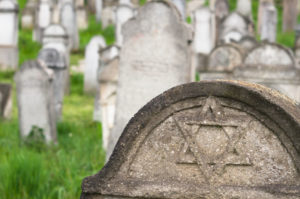Hate Groups on the Rise: What They, and the President, Aren’t Saying

Last week a Jewish cemetery in St. Louis, Missouri, was vandalized by unknown radicals, and this week a Jewish cemetery was desecrated in Philadelphia.
From the dark corners of the Internet, I’ve seen claims that anti-Semitism is not real—an astoundingly inaccurate statement. Just a few weeks ago, I wandered the halls of the US Holocaust Museum in Washington, DC. I thought I’d prepared myself to experience the horrors that occurred under an authoritarian government that propagated myth after myth about certain groups. But despite my mental preparations, I left feeling jaunted and shaken, an Elie Wiesel quote echoing in my mind: “For the dead and the living, we must bear witness.”
It’s shocking to me that we so quickly forget our errors, so brazenly deny entry to those fleeing circumstances similar to what the Jews were going through in the 1940s, and so quickly forget that dangerous rhetoric from politicians isn’t “just words,” but can lead to dangerous policy decisions that devastate individuals. We quickly forget that some prejudiced ideas don’t warrant immediate coverage under the guise of free speech. Some ideas are prejudiced, some are bigoted, and some are absolutely wrong.
When the Southern Poverty Law Center (SPLC) released a report last week indicating that there was an unprecedented rise in hate groups in the United States from 2015 to 2016, I felt a warranted anger welling. The Obama administration’s progressive, inclusive rhetoric over his eight-year presidency was a contributing factor to the steady, significant decline in hate groups in the United States. Whenever there was a hate-motivated tragedy, our president leapt to the side of the victim, offering support and condolences. In contrast, when President Trump was asked about the rise in anti-Semitism as he stood alongside Israeli Prime Minister Benjamin Netanyahu, he rambled on about the size of his Electoral College win rather than addressing anti-Semitism. This was not a president leaping to the side of the suffering—this is a president who is either abetting this behavior or simply out of his depth.
Clearly the rise in hate groups over the past several years has been boosted by Trump’s rhetoric during the presidential campaign and since he took office. The alt-right and its main forum, Breitbart News, have reached audiences in every home and our highest office. Their ideology, as demonstrated by their champion Steve Bannon and legitimized by Trump, is anti-Semitic, racist, homophobic, and transphobic.
What role does religion played in these groups? I decided to reach out to a few that are defined as hate groups by the SPLC, asking a few simple questions regarding the role of religion in their organization and how they felt about the SPLC (and in some cases the FBI) designating them as a hate group.
Unsurprisingly, none of the organizations that I spoke to believed they were hate groups, but most aligned with a religion. The National Alliance, an anti-Semitic, white supremacist group, informed me that they believe themselves to be a kinship-based group where individuals from the same race should cohabitate in the same vicinity, a nuanced form of racial segregation. While the National Alliance rejects Christianity and Abrahamic religions, they adopt cosmotheism, a religion founded by white nationalist Dr. William Pierce, which takes the idea of kinship-based societies and amalgamates them into a religious ideology.
The president of Public Advocate of the United States, an anti-LGBT organization, explained to me that while his organization doesn’t endorse a specific religion, they feel Christianity is under attack, and thus they promote values based on the Judeo-Christian Ten Commandments. Other groups that responded stated they were of myriad religions: Odinists, Christians, Catholics, and others. While some claim to abstain from aligning with a specific religion, all seem to take influences from them. What I found most puzzling, however, was that most groups felt more compelled to discredit the SPLC rather than explain to me just how their group was unfairly designated a hate group.
Rhetoric matters. I’ve found that there is even a small minority of commenters on this very site who try to align humanism with the alt-right. I encourage them to read the words of Steve Bannon, admitting that the alt-right movement has racist, anti-Semitic, and homophobic tendencies. Remember that this man is the loudest and most immediate voice in the president’s ear. I also encourage people to listen to what our president is not saying. Why did it take so long for him to condemn anti-Semitism? Why has Trump been deafeningly silent over the mosque shooting in Quebec by one of his adulators? Or stayed mum on the tragic murder last week in Kansas of Srinivas Kuchibhotla, a promising Indian engineer following his own American dream who died at the hands of a racist who shouted “get out of my country!” before mercilessly shooting him? When a leader remains silent as atrocities occur in his country, he is inadvertently acquiescent to those hateful actions. This is why what such leaders say—and don’t say—matters.
